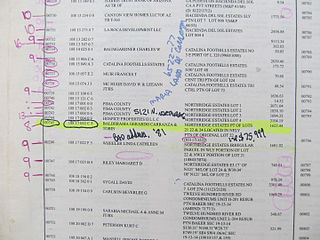In property law, title is an intangible construct representing a bundle of rights in (to) a piece of property in which a party may own either a legal interest or equitable interest. The rights in the bundle may be separated and held by different parties. It may also refer to a formal document, such as a deed, that serves as evidence of ownership. Conveyance of the document may be required in order to transfer ownership in the property to another person. Title is distinct from possession, a right that often accompanies ownership but is not necessarily sufficient to prove it. In many cases, possession and title may each be transferred independently of the other. For real property, land registration and recording provide public notice of ownership information.
A lien is a form of security interest granted over an item of property to secure the payment of a debt or performance of some other obligation. The owner of the property, who grants the lien, is referred to as the lienee and the person who has the benefit of the lien is referred to as the lienor or lien holder.
In common law and statutory law, a life estate is the ownership of immovable property for the duration of a person's life. In legal terms, it is an estate in real property that ends at death when ownership of the property may revert to the original owner, or it may pass to another person. The owner of a life estate is called a "life tenant".
A mortgage is a legal instrument of the common law which is used to create a security interest in real property held by a lender as a security for a debt, usually a mortgage loan. The corresponding term in civil law jurisdictions is hypothec.
Adverse possession, sometimes colloquially described as "squatter's rights", is a legal principle in the Anglo-American common law under which a person who does not have legal title to a piece of property—usually land —may acquire legal ownership based on continuous possession or occupation of the property without the permission (licence) of its legal owner. The possession by a person is not adverse if they are in possession as a tenant or licensee of the legal owner.
Torrens title is a land registration and land transfer system, in which a state creates and maintains a register of land holdings, which serves as the conclusive evidence of title of the person recorded on the register as the proprietor (owner), and of all other interests recorded on the register.
Strata title is a form of ownership devised for multi-level apartment blocks and horizontal subdivisions with shared areas. The word "strata" refers to apartments being on different levels.
Seisin denotes the legal possession of a feudal fiefdom or fee, that is to say an estate in land. It was used in the form of "the son and heir of X has obtained seisin of his inheritance", and thus is effectively a term concerned with conveyancing in the feudal era. The person holding such estate is said to be "seized of it", a phrase which commonly appears in inquisitions post mortem. The monarch alone "held" all the land of England by his allodial right and all his subjects were merely his tenants under various contracts of feudal tenure.

A bona fide purchaser (BFP) – referred to more completely as a bona fide purchaser for value without notice – is a term used predominantly in common law jurisdictions in the law of real property and personal property to refer to an innocent party who purchases property without notice of any other party's claim to the title of that property. A BFP must purchase for value, meaning that he or she must pay for the property rather than simply be the beneficiary of a gift. Even when a party fraudulently conveys property to a BFP, that BFP will, depending on the laws of the relevant jurisdiction, take good (valid) title to the property despite the competing claims of the other party. As such, an owner publicly recording their own interests protects himself or herself from losing those to an indirect buyer, such as a qualifying buyer from a thief, who qualifies as a BFP. Moreover, so-called "race-notice" jurisdictions require the BFP himself or herself to record to enforce their rights. In any case, parties with a claim to ownership in the property will retain a cause of action against the party who made the fraudulent conveyance.

In finance, a security interest is a legal right granted by a debtor to a creditor over the debtor's property which enables the creditor to have recourse to the property if the debtor defaults in making payment or otherwise performing the secured obligations. One of the most common examples of a security interest is a mortgage: a person borrows money from the bank to buy a house, and they grant a mortgage over the house so that if they default in repaying the loan, the bank can sell the house and apply the proceeds to the outstanding loan.

The Land Registration Act 2002 is an Act of the Parliament of the United Kingdom which repealed and replaced previous legislation governing land registration, in particular the Land Registration Act 1925, which governed an earlier, though similar, system. The Act, together with the Land Registration Rules, regulates the role and practice of HM Land Registry.
In law, perfection relates to the additional steps required to be taken in relation to a security interest in order to make it effective against third parties or to retain its effectiveness in the event of default by the grantor of the security interest. Generally speaking, once a security interest is effectively created, it gives certain rights to the holder of the security and imposes duties on the party who grants that security. However, in many legal systems, additional steps --- perfection of the security interest --- are required to enforce the security against third parties such as a liquidator.

A tax sale is the forced sale of property by a governmental entity for unpaid taxes by the property's owner.
In common law jurisdictions such as England and Wales, Australia, Canada, and Ireland, a freehold is the common mode of ownership of real property, or land, and all immovable structures attached to such land. It is in contrast to a leasehold, in which the property reverts to the owner of the land after the lease period expires or otherwise lawfully terminates. For an estate to be a freehold, it must possess two qualities: immobility and ownership of it must be forever. If the time of ownership can be fixed and determined, it cannot be a freehold. It is "An estate in land held in fee simple, fee tail or for term of life."
Note in the UK a lender can take possession of a person's home due to default on a mortgage. This process is incorrectly often known as mortgage repossession; however assets can only be repossessed if the lender was the seller, which is often the case with cars but not usually houses. The correct terminology is possession. The process typically involves obtaining firstly an order for possession in the courts, then an eviction warrant. The eviction is carried out by bailiffs. Once the lender has obtained possession, it can then sell the home to recoup any lost arrears.

Williams & Glyn's Bank v Boland [1980] is a House of Lords judgment in English land and trusts law on an occupier's potentially overriding interests in a home.
Easements in English law are certain rights in English land law that a person has over another's land. Rights recognised as easements range from very widespread forms of rights of way, most rights to use service conduits such as telecommunications cables, power supply lines, supply pipes and drains, rights to use communal gardens and rights of light to more strained and novel forms. All types are subject to general rules and constraints. As one of the formalities in English law express, express legal easements must be created by deed.

English land law is the law of real property in England and Wales. Because of its heavy historical and social significance, land is usually seen as the most important part of English property law. Ownership of land has its roots in the feudal system established by William the Conqueror after 1066, and with a gradually diminishing aristocratic presence, now sees a large number of owners playing in an active market for real estate. The modern law's sources derive from the old courts of common law and equity, along with legislation such as the Law of Property Act 1925, the Settled Land Act 1925, the Land Charges Act 1972, the Trusts of Land and Appointment of Trustees Act 1996 and the Land Registration Act 2002. At its core, English land law involves the acquisition, content and priority of rights and obligations among people with interests in land. Having a property right in land, as opposed to a contractual or some other personal right, matters because it creates privileges over other people's claims, particularly if the land is sold on, the possessor goes insolvent, or when claiming various remedies, like specific performance, in court.

South African property law regulates the "rights of people in or over certain objects or things." It is concerned, in other words, with a person's ability to undertake certain actions with certain kinds of objects in accordance with South African law. Among the formal functions of South African property law is the harmonisation of individual interests in property, the guarantee and protection of individual rights with respect to property, and the control of proprietary relationships between persons, as well as their rights and obligations. The protective clause for property rights in the Constitution of South Africa stipulates those proprietary relationships which qualify for constitutional protection. The most important social function of property law in South Africa is to manage the competing interests of those who acquire property rights and interests. In recent times, restrictions on the use of and trade in private property have been on the rise.

Registered land in English law accounts for around 88 per cent of the total land mass. Since 1925, English land law has required that proprietary interests in land be registered, except in cases where it is necessary to protect social or family interests that cannot reasonably be expected to be registered. English law also runs a parallel system for around 12 per cent of land that remains unregistered.







